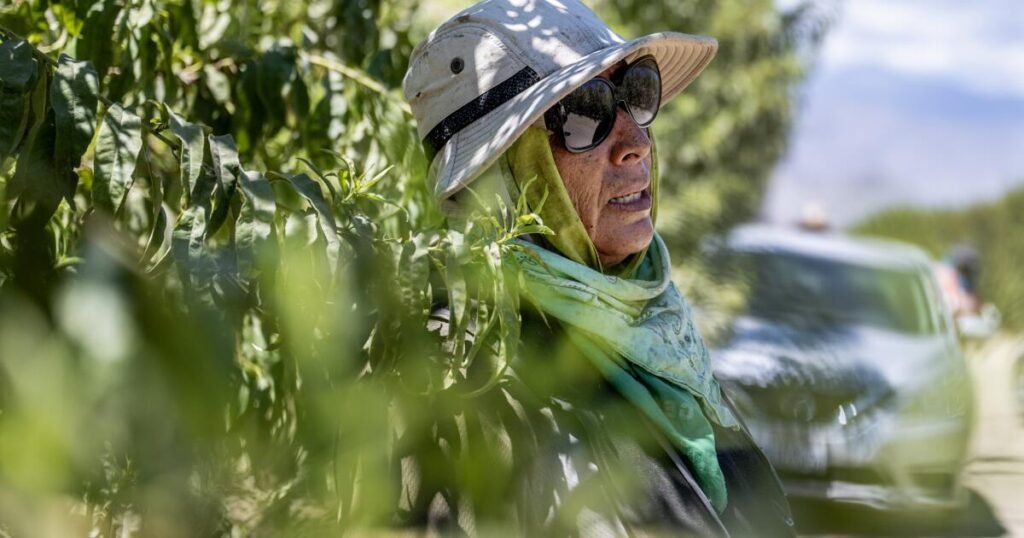Erika Patricia Delque Barros was working in the tomato fields in Yolo County when she first felt the shivers and nausea. A Colombian immigrant with little experience working in fields, she didn't realize the summer heat could make her sick.
“I didn't know the sun out here could kill you,” DeRook Barros said. “I didn't know what sunstroke was, and no one told me what was going to happen.”
Two weeks later, while working in the scorching heat, she started feeling dizzy and nauseous again. She went to rest under a tree, but felt sick again as soon as she returned to work. She and five others got permission from their boss to leave early because they felt it was too hot to work safely.
But when the workers returned to the site early the next morning, they were given their final checks and fired, according to a complaint filed with the state Labor Commission.
“I was shocked, I felt humiliated, I felt sorry,” Deruque Barros recalled. “On the one hand, I keep thinking, 'I should have put up with it, because I needed my job,' but on the other hand, I also think that people should have dignity and shouldn't have to put up with so much just for a job.”
The state Agricultural Labor Relations Board is investigating the incident as a retaliatory firing, and the workers, now known as the “Yolo Six,” are being held up as an example of why California needs to do more to enforce compliance with farmworker heat safety rules that have been in place for nearly two decades.
A bill on Gov. Gavin Newsom's desk aims to make it easier for farmworkers to file workers' compensation claims for heatstroke and require employers to comply with the state's outdoor heat safety standards.
SB 1299 changes the burden of proof in workers’ compensation claims when farmworkers suffer heat-related injuries after working outdoors for employers that don’t comply with heat standards. Instead of farmworkers having to prove that their injury occurred while on the job, as is often the case in workers’ compensation cases, it will be the employer’s responsibility to prove that the illness is not work-related.
Opponents of the bill, including the California Chamber of Commerce and the California Agriculture Bureau, acknowledge the importance of protecting agricultural workers from heatstroke but say the issue should not be addressed through the workers' compensation system.
The law comes as many farm workers continue to work in unsafe conditions and California's Department of Occupational Safety and Health faces severe staffing shortages that make it difficult to enforce heat regulations for outdoor workers.
The state's heat stroke prevention rules, first enacted in 2005, require employers to provide workers working outdoors with fresh water, shade at least 80 degrees Fahrenheit, and any cool-down breaks requested by the worker. Employers must also maintain a heat stroke prevention plan that includes effective training for supervisors to recognize the signs and symptoms of heat stroke.
Enforcing the rules has proven difficult.
In 2009 and 2012, the United Farm Workers Sued Cal/OSHAThey accused authorities of not enforcing the regulations.
a 2022 Survey A study by the University of California, Merced's Community Labor Center found that many farmworkers continue to work without protections.
Of the more than 1,200 farmworkers surveyed, 43% said their employers don't offer a heatstroke prevention plan, 15% said they don't receive training on heatstroke prevention, 20% said their employers don't monitor temperatures on hot days, 15% said their employers don't provide enough shade for breaks when temperatures reach 80 degrees or higher, and 22% said their employers don't monitor for heatstroke when temperatures reach 95 degrees.
“This is a really deep-rooted challenge of how do we ensure that what’s in the law is also applied on the ground,” said Antonio de Loera Brusto, communications director for the UFW, which is a sponsor of SB 1299.
The bill's author, Sen. Dave Cortese (D-San Jose), described SB 1299 as “a creative workaround that leverages the tools we have available to us and tries to put together an approach that will encourage greater compliance.”
Under the bill's provisions, if an employer fails to comply with the rules, any heat stroke suffered by an employee as a result “shall be presumed to have arisen from and in the course of that employment.” This creates a “rebuttable presumption” that is often used for police officers and firefighters who suffer certain injuries that may result from the inherent risks of their jobs.
“I feel like it might actually be effective because employers hate the workers' compensation presumption so much,” Cortese said. “Their avoidance factor is so high that they'll say, 'Oh my goodness, it's actually easier to provide shade and water than it is to deal with a surge in workers' compensation claims.'”
“We're taking what they see as a thorn in their side and trying to use it as a deterrent against the kind of behavior we're seeing,” he said.
Ashley Hoffman, a senior policy advocate at the California Chamber of Commerce, challenged this approach at a congressional committee hearing in June, arguing there's no evidence that the workers' compensation system is not working when it comes to farmworker heat injury claims.
She pointed Legislative Analysis By California Workers' Compensation Association They found that few farmworker heat stroke claims are filed in California, and the analysis found that the denial rate for farmworker heat stroke claims, at 11 percent, was lower than the denial rates of 12.4 percent to 13.3 percent for other outdoor occupations subject to heat standards and the denial rate for all claims, at 14.7 percent.
“The data shows that the system itself is working well and is working as it's supposed to with respect to these claims, so using a very specialized workers' compensation system with its own procedures to address this separate problem is not the right solution,” Hoffman said during the hearing.
Brian Little, employment policy director for the California Farm Bureau, called the bill “a solution in search of a problem.” He noted that the California Department of Occupational Safety and Health is already recruiting for new agricultural units and would significantly expand its enforcement offices, which include the communities of Lodi, Salinas, El Centro and Fresno.
“I don't know what else to say,” Little said. “It's problematic to continue adding rebuttable presumptions to workers' compensation law when they're not really necessary. California's Occupational Safety and Health Department is already trying to address this issue.”
Governor Newsom has until September 30 to decide whether to sign or veto the bill.
This article is from The Times Fairness Reporting Initiative, Funded James Irvine FoundationInvestigate the challenges facing low-income workers and efforts to address them. Economic inequality in California.







